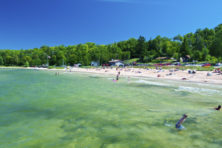Great Lakes Study Commission Looks Into Water Level Fixes
- Share
- Tweet
- Pin
- Share
The International Joint Commission will return to Door County in July to present findings of the latest stage in its study of declining water levels on Lake Michigan.
When the commission presented its findings in March of 2010, it determined that the bulk of the decline in water levels since the 1960s was due to climate change. The study concluded that ongoing erosion in the the St. Clair River is not responsible for the drop in Upper Great Lakes water levels, though pre-1962 dredging was responsible for at least a 16-inch drop in lake levels.
That portion of the study didn’t examine possibilities for remediation to bring levels back up, but public input pushed hard for that information
In July, the commission will present their restoration analysis, which looked at several options for regulating the water flow of the St. Clair River. Their analysis includes a look at what the possibilities are, how much they would cost, and what impacts it would have on other aspects of the Great Lakes.
The study also examines regulation of Lake Superior outflow and possible multi-lake regulations in response to climate change.
The study will be posted for the public to view in early June after the peer review process is completed.

